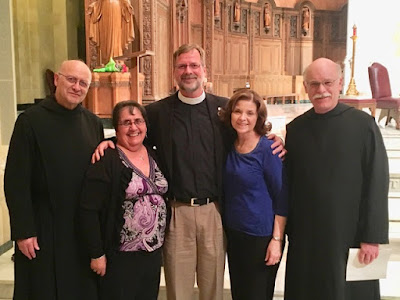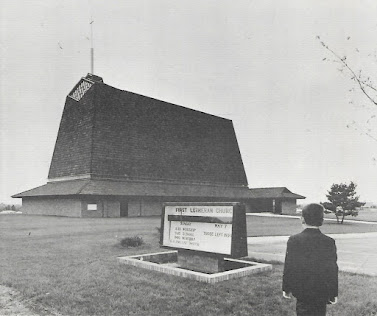We Are Church Together… Ecumenically
By Rev. Steve Meysing, Assistant to the Bishop
“How good and pleasant it is when God’s
people live together in unity.” Psalm
133:1
Since my
upbringing was ecumenical, I’m glad the Psalmist said unity and not uniformity.
Dad was Roman Catholic and made sure I went to mass every Sunday and attended
CCD after school on Wednesdays. In the summer, my Evangelical Covenant Church
mother signed me up for Vacation Bible School at Protestant Churches. Every one
of her siblings, my aunts and uncle, ended up in a different branch of the
Christian family tree, and got along well most of the time. Experiencing this
diversity in the Body of Christ that is the Church, God’s people in community,
was a great way to grow up.
Upon learning
the history of the Moravian Church during seminary, I was struck by their
oft-repeated, defining statement: “In essentials, unity. In non-essentials,
liberty. In all things, love.” As a Lutheran Christian, the proclamation of
Jesus Christ crucified and risen as Lord and Savior isn’t negotiable for me. I
believe the Lutheran Confessions are
a faithful interpretation of scripture. And, I believe that other denominations
help reveal the truth of the Gospel and make Christ known to the world. Our
Evangelical Lutheran Church in America, designed to be intentionally
ecumenical, has recognized the essential marks of Church and ministry and
established Full Communion relationships with the Presbyterian Church USA,
Reformed Church in America, United Church of Christ, Moravian Church, Episcopal
Church, and United Methodist Church. We see Christ at work in each other. My first
desires are for people to know Christ, and to recognize Christ in others.
Those desires
have led to some exciting moments in the past. Worshipping with the board of an
ecumenical ministry in Canada’s Arctic, where the sermon was from a Catholic
nun, the liturgy by a Lutheran, and Communion consecrated by an Anglican.
Presiding at Communion in an Inukitut-speaking Anglican congregation that
hadn’t seen a priest in months. Sharing youth group leadership with dedicated
United Methodist lay people. Creating a shared and vibrant Easter Vigil for
Presbyterians, Episcopalians, United Methodists, and ELCA Lutherans.
Today it means
video meetings or conversations with my counterparts in the United Methodist,
Presbyterian, and Episcopal churches as we figure out how to provide ministers
for central and western Nebraska. It also means once a month, on my day off, serving
an Episcopal congregation so that they have sacraments. It means council
meetings in multiple-church parishes or federated churches where we work
side-by-side with Presbyterians, Methodists, or Episcopalians. And part of what
sustains me in all this is a monthly prayer and study gathering of Benedictine
Oblates (Christians who are learning to integrate 1500-year old spiritual
practices into daily life) who are Roman Catholic, Orthodox, Seventh Day
Adventist, Lutheran, and Methodist. In our gatherings, the gifts of each person
and their background are listened for, and Christ is at the center.
By the grace of
God, I’ve learned about passion for mission from Moravians, moving preaching from
Presbyterians, beauty in liturgical words from Episcopalians, healthy church
structures from Methodists.
Here are just a
few ways that we are we being church together, ecumenically, in the Nebraska Synod. Across Nebraska, ELCA pastors serving ELCA
congregations are also serving Episcopal parishes that need part-time ministers
or just worship leaders. We receive the
gifts of ministers from our Full Communion partners when they serve as supply
and transitional ministers in Nebraska Synod congregations. Vacation Bible
School and youth groups are increasingly ecumenical endeavors in our
communities. Our assistants to the bishop now have video meetings with their
counterparts in the Presbyterian Church USA, United Methodist Church, United
Church of Christ, and Episcopal Church to identify ministers for congregations,
from pulpit supply work to call.
We can be stronger together.
Our Lutheran identity and values are often clarified and strengthened when we
work with other Christians, when we reflect on why we believe and do the things
we do.
And you? How are
you being church together, with neighboring congregations? What insight or gift
have your received from time spent with a sibling who is not
Lutheran? When and where have you encountered Christ while walking and serving
together?





Comments
Post a Comment